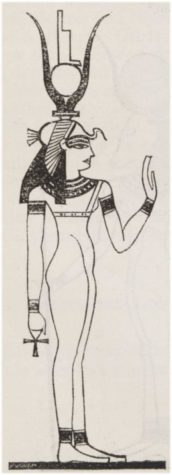Visiting the Story of Cupid (Eros) and Psyche
Cupid, the god of love, has been struck by his own arrow.
The main source for the Cupid and Psyche myth is from the ‘Metamorphoses’ by Apuleius, which dates to the second half of the 2nd century CE.
He was mischievous and cocky, and he was turned into a donkey. The Metamorphoses of Apuleius, commonly referred to as The Golden Ass, follows the misadventures of the hero turned donkey, Lucius, and the stories he hears along his travels throughout the Roman empire. The novel was written in the 2nd century AD by Lucius Apuleius Madaurensis, naming the main character after himself.
One notable story is that of the god, Cupid, and the mortal, Psyche. It begins with Psyche’s beauty causing her admirers to neglect their worship to Venus, the goddess of beauty, and instead worship her. In turn, the goddess plotted revenge against Psyche by ordering her son Cupid to strike the girl with an arrow and force her to fall in love with the most horrible, hideous beast alive. However, when Cupid saw Psyche’s beauty, he inadvertently shot himself with the arrow, thus falling in love with her.
Meanwhile, Psyche and her family became worried that she would never find a husband, for, although men admired her beauty, they always seemed content to marry someone else. Psyche’s father prayed to Apollo for help, who instructed her to go to the top of a hill where she would marry not a man but a serpent. Psyche followed the instructions, but once on top of the hill, Zephyr, the God of Wind, carried her down to a castle. Upon entering the castle, unexpected voices announced that the home and its riches belonged to Psyche. Every night afterwards, Cupid visited her, but he forbade her to look at his face. However, Psyche’s sisters goaded her into finding out who her lover was, and, on their insistence, she lit a lamp one night. She was startled after seeing Cupid, she accidentally dropped oil on his face. He immediately fled, leaving her behind in the castle.
Devastated, but determined, Psyche wandered the earth looking for Cupid and thought of visiting Venus in hopes of finding him. Once she stumbled upon the goddess, Venus instructed Psyche to perform a series of impossible tasks as a means of enacting her revenge. One of them included collecting the black water from the rivers Styx and Cocytus, which led to the Underworld. Psyche ultimately succeeded in all her tasks, and was reunited with Cupid. They end up marrying each other, and Psyche was later made goddess of the soul by Zeus.
To some critics, this story examines themes of love and perseverance, while others are more critical of the elements presented in the tale. Mr. Carli, Bronx Science’s Latin teacher, who used the story for practicing Latin translation, said, “The tale is a little beauty and beast for me, and it ignores any realistic themes. It’s all about obeying the Gods or you will face punishment, and I find that generic.”
Tamar Padwa ’24 said, “Her family was questionable, and I found the act of Cupid fleeing, without first talking to Psyche about the situation, to be overly dramatic.”
Although some may not enjoy the story, it had an undeniable influence on understanding ancient antiquity. For instance, the story of Cupid and Psyche is unorthodox since it is one of the few Greco-Roman literary works that portray a woman in the role of a hero. At the time, Greco-Roman myths established foundations for male dominance. Starting with the myth of Pandora, the first woman to be created, her role in society was that of a beautiful woman who would test the faithfulness of men. In Hesiod’s work of Theogony where much of this myth is first derived, he writes, “Then the gods and mortal men were struck with amazement when they beheld this sheer inescapable snare for men.” It creates a narrative where women are highly sexualized, and this pattern continues among the myths of Zeus and his multiple affairs. Even among the Amazon mythologies, with the Amazon being a women-only society, the warrior-women were constantly defeated by male heroes. To name a few, there is Theseus’s abduction of Hippolyta, the Amazon queen, or in other tales, her betrayal towards her kingdom by willingly leaving with Theseus, or take the story of Hercules and his ten laborers, where he defeated all of Hippolyta’s best warriors for a griddle. Also, in Ovid’s story of Medusa in his book Metamorphoses, Apuleius drew inspiration for his own Metamorphoses. Women were often depicted as monsters, such as Medusa, or tragic maidens with a focus on women’s submission. However, Apuleius’ portrayal of Psyche breaks away from this narrative, diverging away from Ovid from whom he drew inspiration, and highlights women in the role of a hero.
Historians value the story because of its connection to ancient, mystery religions. These mystery religions were a collection of secret cults in the Greco-Roman world that offered individuals religious experiences that were not provided by official public religions. They had all started small but grew into international religious groups that worshiped unorthodox gods. The mystery religions would never have developed and expanded without the new social conditions brought about by the unification of the Mediterranean world by the Romans.
People who were displaced by the Romans were drawn towards the companionship of a community. Additionally, individuals who felt that their values were objected to by the empire also turned to a community that offered them hope for a better future.
Apuleius may have been a follower of one of these mystical religions. As he traveled throughout the Mediterranean region, it is believed that he became interested in contemporary religious initiation rites. Later, he joined a cult that worshiped the Egyptian goddess Isis.

Some customs of these religions include a period of preparation before initiation. In the cult of Isis, followers needed to undergo a period of eleven days of fasting that included abstinence from meat, wine, and relations with other people. The candidates were separated from the common folk in special apartments in the holy precinct of the community center; they were called “the chastely living ones” (hagneuontes). The initiation ceremonies also usually mimed death and resurrection. In some ceremonies, candidates were buried or enclosed in a coffin; they were even symbolically deprived of their entrails and symbolically mummified (an animal’s belly with entrails was prepared for the ceremony).
Interestingly, individuals who joined the communities usually had their beliefs and initiatives rejected by the social norms of the empire; however, they still pledged loyalty to the Roman Empire. For instance, the initiation ceremonies always contained a prayer for the welfare of the emperor and for the good fortune of the empire as a whole. The members of these communities were grateful for the security, peace, and opportunities guaranteed to them by the emperor.
Furthermore, these mystery religions put a notable emphasis on romance in their literature. Some theorize that the literary genre of romance was developed by their narratives, which were written to accentuate the miracles of the Gods — the story of Cupid and Psyche is only one example. These narratives were preserved in many temple libraries, some written in papyrus and others on stone.
The themes of the Cupid and Psyche story represent a longing for companionship, reflecting on many of the followers’ own need for a community and stability. It is worthwhile to note that the story of Cupid and Psyche may be one of the only myths with a ‘happy ever after.’ It adheres to a safe passage of the members in their journey of acceptance, and they later achieve it. The emphasis on Psyche as the main protagonist and hero, uncommon in that time, correlates with Apuleius’s own worship of a Goddess. Overall, the blend of historical and literary elements make Cupid and Psyche timeless.
Apuleius may have been a follower of one of these mystical religions. As he traveled throughout the Mediterranean region, it is believed that he became interested in contemporary religious initiation rites. Later, he joined a cult that worshiped the Egyptian goddess Isis.
Nusaiba Afra is a Staff Reporter for 'The Science Survey.' She finds journalism to be a great way to entertain and to inform people. She especially enjoys...











